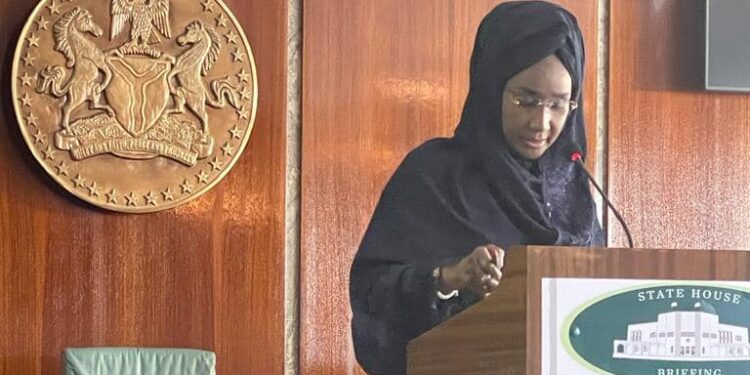…….as economic expert estimates N40,000 feeding cost for family of four
By Sunday Elom
On Thursday 17th February, 2022,the Minister of Humanitarian Affairs, Disaster Management and Social Development, Sadiya Umar Farouq, said the N5,000 ($12) is lifting households in rural communities out of poverty.
Responding to questions during a Ministerial Briefing at the Presidential Villa, Abuja, she said that only the elites believe the N5,000 monthly cash transfer to vulnerable households by the federal government is insignificant.
She said many of the beneficiaries cried and shed tears because they have never seen N5,000 in their lives, so, the cash transfer is significantly transforming their statuses.
“It goes a long way, it changes their status and by that, it lifts them from one stage to another,” she said unabashedly.
Buttressing her claims, Farouq said she had gone to the field and seen the people, revealing that the beneficiaries were able to contribute N1,000 from the N5,000 to buy a vehicle.
“If it is not changing their economic status, I don’t think anybody will force them to contribute that N1,000 to provide that vehicle for their use,” she argued.
But checks by Orient Daily showed that her claims were largely unrealistic. Nigeria had suffered from two critical recessions, and inflation driven by multiple factors including the pandemic.
Despite global outlook for an economic recovery, prices of foods have continued to skyrocket.
A National Bureau of Statistics (NBS) January 2022 report on market prices of selected food shows a progressive increase in the prices of food and food items across Nigeria.
According to the NBS, average price of 1kg of beans (white, black eye, sold loose) stood at N481.47, a 51.92 percent increase from N316.92 in January, 2021 and 0.14 percent increase from N480.79 in December, 2021.
The average price of one tuber of yam stood at N331.24, representing a 41.15 percent increase from N234.67 in January 2021 and 0.76 percent increase from N328.75 in December 2021. The average price of 1 bottle of palm oil increased by 1.24 percent to N805.45, from N795.57 in December and a 42.73 percent increase from N564.31 in January 2021.
Similarly, MBS said the average price of 1kg of “Rice Agric Sold loose” in January 2022 was N480.5. This showed a 0.86 percent increase from N476.4 in December 2021 and 7.09 percent increase from N448.7 in January 2021.
Likewise, the average price of 1kg of Tomato stood at N367.01, showing a 2.80 percent increase from N357.03 in December 2021. And the average price of 1kg of frozen chicken sold at N2275.78 with a 2.80 percent increase from N357.03 in December 2021.
While Farouq did not specify whether her claims apply to beneficiaries across the country, to some geopolitical zones or a particular state, though NBS report stated that “prices are collected across all the 774 local governments across all states and the FCT from over 10,000 respondents and locations and reflect actual prices households state they actually bought those items.”
Speaking with Orient Daily, an economic expert and financial analyst, Babawale Saheed Adeolu, said the minister had not consulted the right people among the beneficiaries or the people consulted have other means of subsistence.
“Mind you she was unable to give the method she used to gather her facts,” he said.
According to Adaolu, although living cost in Nigeria “varies from one geopolitical zone to the other, even from one state to the other but averagely, irrespective of where one lives in Nigeria as of today, family of 4 should spend at least N40,000 monthly.”
But a breakdown of purchasing power of N5,000 based on the NBS data which captured all the six geopolitical zones in Nigeria, showed that a beneficiary can only buy 1 kg of beans, 1 tuber of yam, 1 bottle of palm oil, 1 kg of local rice, 1 kg of tomato and 1 kg of frozen chicken at a total cost of N4, 741.45.
This therefore means that the beneficiary is left with N258.55, with many yet-to-buy food items, he said.
Recalled that the federal government in November 2021, announced that it will replace the controversial fuel subsidy with a monthly N5,000 transportation grant to vulnerable(poorest) households.
“If government is giving out the N5,000 to vulnerable people without necessarily talking about subsidy removal I will say it’s a better idea, but when they’re giving them N5,000 and they remove the subsidy, I can tell you categorically that the damage they do to economy is much more than the benefits that N5,000 will bring.
“There is a particular theory in Economics; we call it ‘Pareto Optimality Criterion’. It states that “a change is necessary and desirable, only when it makes some people better off and makes no one worse off.” the compensation is not up to what the household will lose.” Adaolu said.

